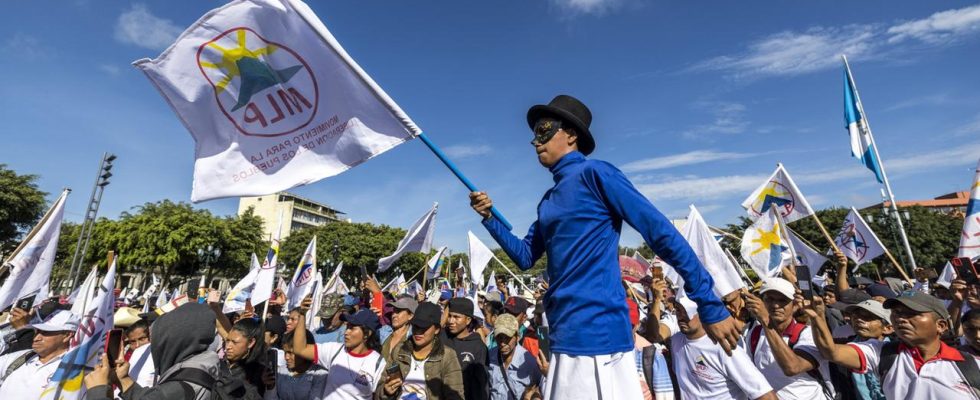Today there is an election in Guatemala. For most people, poverty and violence characterize everyday life. Observers view the development of the Central American country with concern – and fear for democracy.
Adeleida López follows the election campaign on the radio. It dangles from a loop on the corrugated iron roof outside her house. López lives in a poor village in the department of Huehuetenango, in northwestern Guatemala. She thinks the election promises are all lies. For example, that food should become cheaper. The 30-year-old indigenous mother of four has little hope that her situation will change with a new government.
In front of their simple house made of adobe and earth there are plastic tubs and barrels to collect rainwater. But that hasn’t happened for months – climate change is making itself felt. She grew potatoes and corn on a small, manageable field. From the harvest she would be able to survive for a few months. But without water, the plants threaten to dry up.
The 30-year-old mother of four, Adeleida López, has little hope that her circumstances will change with a new government.
60 percent of the population lives in poverty
Around 60 percent of the population in Guatemala lives in poverty, and 50 percent of the children suffer from malnutrition. Poverty, violence and the consequences of climate change characterize everyday life. Millions no longer see any prospects in their homeland, and many are fleeing to the United States.
Today, the country’s almost 9.4 million eligible voters are called upon to cast their votes. The president and his deputy, 160 members of congress, 340 mayors and 20 members of parliament of the Central American country are elected.
Today, almost 9.4 million eligible voters in Guatemala are called upon to cast their votes.
Warning of decay of democracy
But human rights organizations are warning of a decline in democracy in Guatemala. Independent judges, public prosecutors and representatives of indigenous organizations are being criminalized, and the press is being persecuted. Recently, the government-critical newspaper “El Periódico” had to close. The daily newspaper repeatedly uncovered significant cases of corruption. Editor-in-chief José Rubén Zamora was sentenced to six years in prison. The charge: money laundering. The journalists’ association speaks of a politically motivated process.
The head of the international development aid organization Oxfam in Guatemala, Ricardo Saenz de Tejada, views this development with great concern. There can be no question of democratic elections. “These elections are taking place in the context of an authoritarian offensive. In Guatemala, an alliance of illegal political and economic networks has de facto power. They are corruption networks, organized crime networks involving businessmen, politicians, civil servants, retired and active military personnel. You’ve taken control.”
Zury Ríos’ candidacy is considered particularly controversial. As the daughter of the late general and dictator Efraín Ríos Montt, according to the constitution, she should not have run at all.
candidates out flimsy reasons excluded
These circles are known as the “Pact of the Corrupt”. Observers are convinced that this alliance will ultimately put the future president of Guatemala in office. Three presidential candidates were not admitted in advance.
The Guatemalan constitutional court barred her from voting on flimsy grounds. Among them was the indigenous Thelma Cabrera with her vice. The left-wing politician had started for the “Movement for the Liberation of the Peoples”. What remains are 21 candidates standing for election.
Former UN diplomat Edmond Mulet of the centre-right Cabal party has been accused of colluding with the government.
Three controversial favourites
The current President Alejandro Giammattei can no longer stand after one legislative period. Three candidates are now considered favorites: Zury Ríos’ candidacy is considered particularly controversial. As the daughter of the late general and dictator Efraín Ríos Montt, according to the constitution, she should not have run at all. However, the courts have approved participation in this case.
Former UN diplomat Edmond Mulet of the centre-right Cabal party is also considered a favourite. He is accused of colluding with Giammattei’s government. 67-year-old Sandra Torres is competing for the third time. The former president’s wife is said to be involved in various corruption cases. A run-off election is considered likely, since in the first ballot none of the candidates will probably get over the necessary 50 percent.
Former first lady Sandra Torres is said to be involved in various corruption cases.
Fight against gang violence like in El Salvador
According to Walter Corzo, who monitors the elections with his non-governmental organization Dialogos, the issue of security played a major role for many candidates in the election campaign, and not just for the favourites. Because Guatemala also suffers from massive violence by criminal gangs. More than 3,000 people were murdered last year.
The candidates had primarily advertised with the controversial strategy of the authoritarian President Nayib Bukele. With a permanent state of emergency and mass arrests, he managed to stem the violence in El Salvador. He gets a lot of approval from the majority of the population. Many seem to accept that their rights will be curtailed.
Migration to the US
Until the end of the election campaign, politicians toured the communities in search of votes. Distributing items included saucepans, soccer balls and even postdated checks that can only be cashed out if the contestant wins. Adeleida López hears presidential candidate Sandra Torres on the radio that day. The candidate promises that the change will be initiated with her election.
But Adeleida doesn’t want to rely on that. A few weeks ago her husband left for the United States, as do thousands of Guatemalans every month. “My husband left 22 days ago. He can’t make any money here in Guatemala, so he wants to go to the US so he can take care of our children. God knows if he’ll ever get there,” she says.
Just a few days ago, two deportation flights landed in Guatemala City. On board were 400 men and women who had hoped for a better future in the United States.

